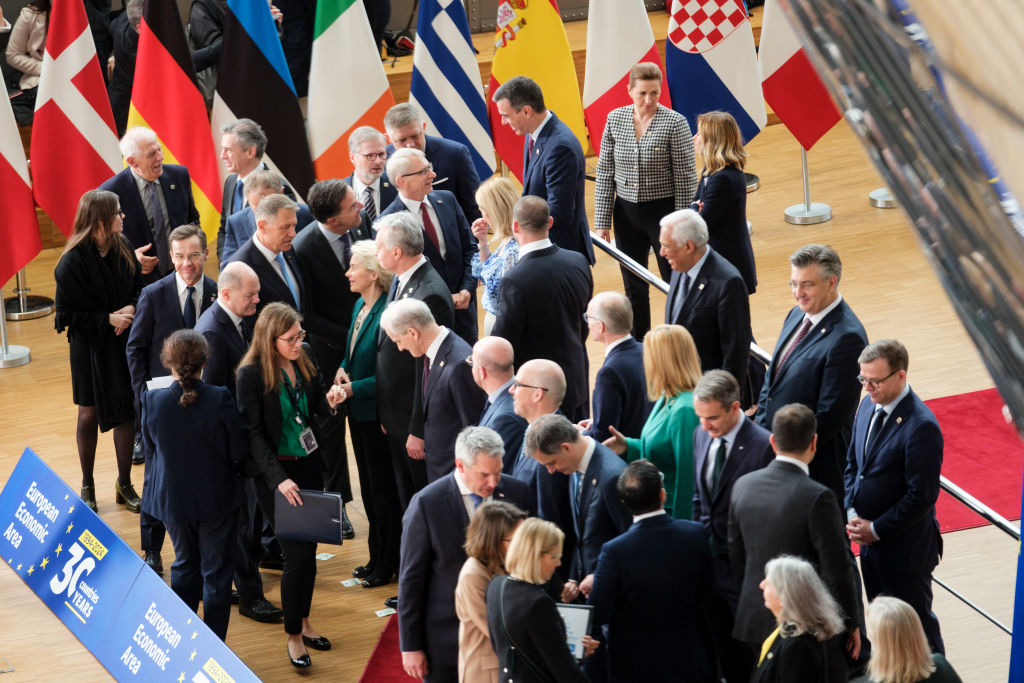President Donald Trump abruptly reversed course earlier this month when he decided to send Patriot missiles, along with other possibly offensive weaponry, to Ukraine, provided that European nations pay the United States for them. Trump also announced that he would place 100 per cent tariffs on Russia if, after 50 days, Russian President Vladimir Putin had failed to move to a ceasefire.
The shift irritated some on the American Right, who wish to see Europe do more on a war which directly affects them, but it pleased the Ukrainian government and pro-Ukrainian voices in the United States.
But for some in Europe, however, it was not enough. Kaja Kallas, the High Representative of the European Union for Foreign Affairs and Security Policy (as close as the EU gets to a “foreign minister”) complained about Trump’s decision, saying, “We would like to see the US to share the burden” [sic]. And Denmark’s foreign minister whined about the 50 day period, saying that it was “rather long.”
These are relatively small statements, but they so perfectly highlights everything that is wrong with how the European Union approaches the Russo-Ukrainian War, relations with the United States, and even foreign policy itself.
Let’s start small and focus on Kallas, who has a history of telling Americans what their foreign policy should be. Kallas was once the prime minister of Estonia (1.3m population). Situated in Europe’s north, Estonia is a wonderful country full of fair-minded, hardy people. It is also, for understandable historical reasons, entirely obsessed with Russia. All of its foreign policy is devoted to protecting itself from Russia and to convincing other larger countries to help protect it. The job of an Estonian prime minister is to ensure this support.
But as the head of the European Union’s foreign policy – such as it is – your job is bigger. It requires an understanding that Russia is not the only country which exists, and it also requires some finesse in handling foreign policy. Leaders of countries who are constantly threatened sometimes forget that countries which are not threatened to not feel the panic they feel. Ukrainian President Volodymyr Zelensky made this mistake when he sought to lecture Trump and Vice President JD Vance in the Oval Office earlier this year.
Trump is already risking ire on his right flank for embracing more weaponry to Ukraine. Making it harder for him by critiquing his action, saying it’s not enough, is diplomatically baffling. The Russo-Ukrainian War, after all, transparently affects Europe far more than it does the United States. There should be no equal burden sharing whatsoever. Ukraine is not a NATO member and the war is on Europe’s borders, fought by Europeans, and concerns European land. It affects the United States, but it affects its periphery.
Which brings us to Europe’s relationship to America. It has been rocky during both Trump presidencies, as President Trump has demanded Europe do more. To that end they have begrudgingly increased defence spending, agreeing to spend five per cent of GDP on defence by the mid-2030s (though even that agreement is rife with exceptions). But Europe has been frustrated the entire time, and clearly believes that it is in America’s interests for the US to defend the EU; these frustrations were borne out in the words of one EU official, who said they would need to wait “until Trump is dead” to get back to how things were.
Europeans are constantly trying to figure out how to become great again (to borrow a phrase), as indicated by a recent French parliamentary paper which suggests allying with China and instituting some sort of global currency. But until they cut their social safety nets (the immense cost of which are the real reason they need America’s defence dollars), those dreams are fantastical.
Which gets us to the issues at the heart of the European Union’s foreign policy: It is mostly built on fantasy. Europe’s armies have atrophied; while countries like Germany are planning on rebuilding their armies, those plans are just that, plans, unmet by concrete action. France is being kicked out of its pseudo-colonies left and right (by Russia, of all countries), and no no longer has any military bases in western or central Africa. How on Earth are they going to lead the way to some sort of global currency if they cannot manage their own backyard?
How is Europe going to pay for its social safety nets and armies capable of taking on Russia? They never say, but the answer is that they simply do not have the money. They claim that their restored soft power will make up for it, but there is no indication of where this soft power will come from. Yes, America may be more demanding as of late, but it still has the power of the purse, meaning that middle-tier and lower-tier countries will still come asking. Europe has the power of…what, exactly?
The reality of their situation is revealed by their failure to step in to replace America’s cutting of USAID programmes in Africa. If Europe had the money, they’d replace America’s funding. But they don’t, so they haven’t. They will talk a big game of doing the right thing, of course. But if it’s between free healthcare and money for soft power, European leadership will pick the former every time.
This fantasy is fully ensconced in Kallas’ statement on burden-sharing. It’s full of the fantasy that money does not really matter, only principle does. It should not matter if the war affects Europe more; the principle should be that America shares the burden.
It’s a nice sentiment (if you work in Brussels). But it’s not how foreign policy works. And if the EU continues to harangue America, even when America is helping, they’ll soon find themselves without much help at all.





EU smears US with ‘isolationism’ but it forces Europe to do more